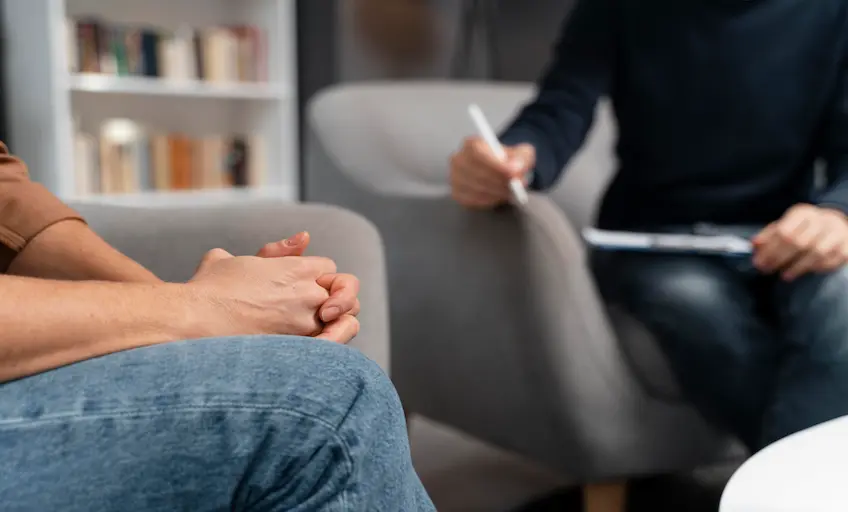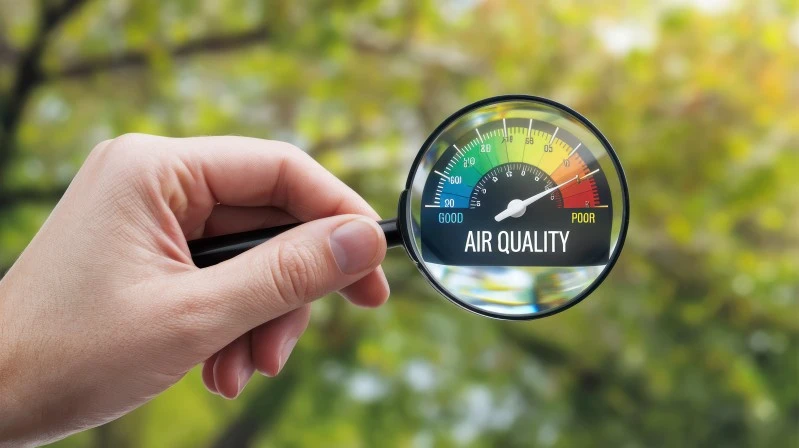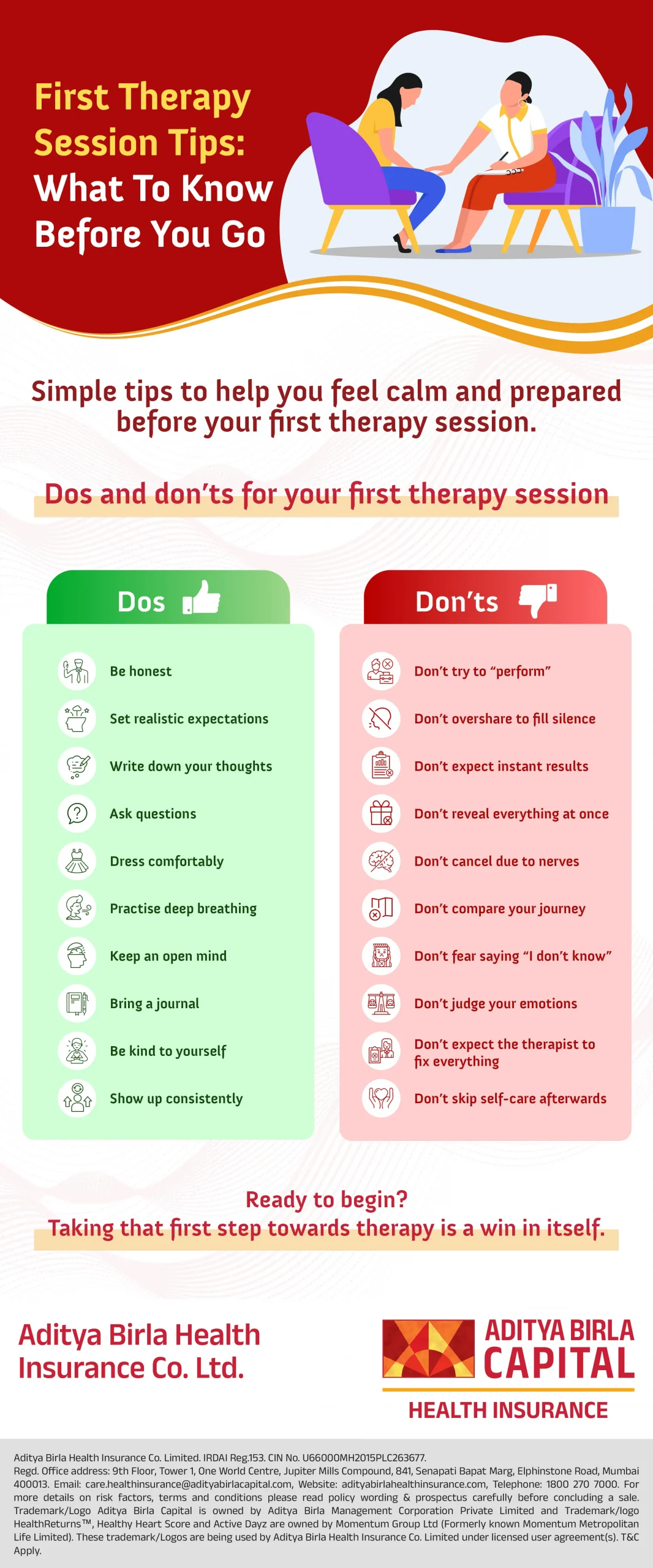
Feeling nervous about attending therapy is a normal reaction. You’re taking a significant step towards working on yourself, processing trauma, or opening up about things you’ve never shared before.
Know that you’ll probably experience many feelings before, at the start of, and during therapy. All of these emotions are valid and a normal part of the process. But being prepared and knowing what to expect can help calm some of your nerves.
Why does preparing for your first therapy session matter?
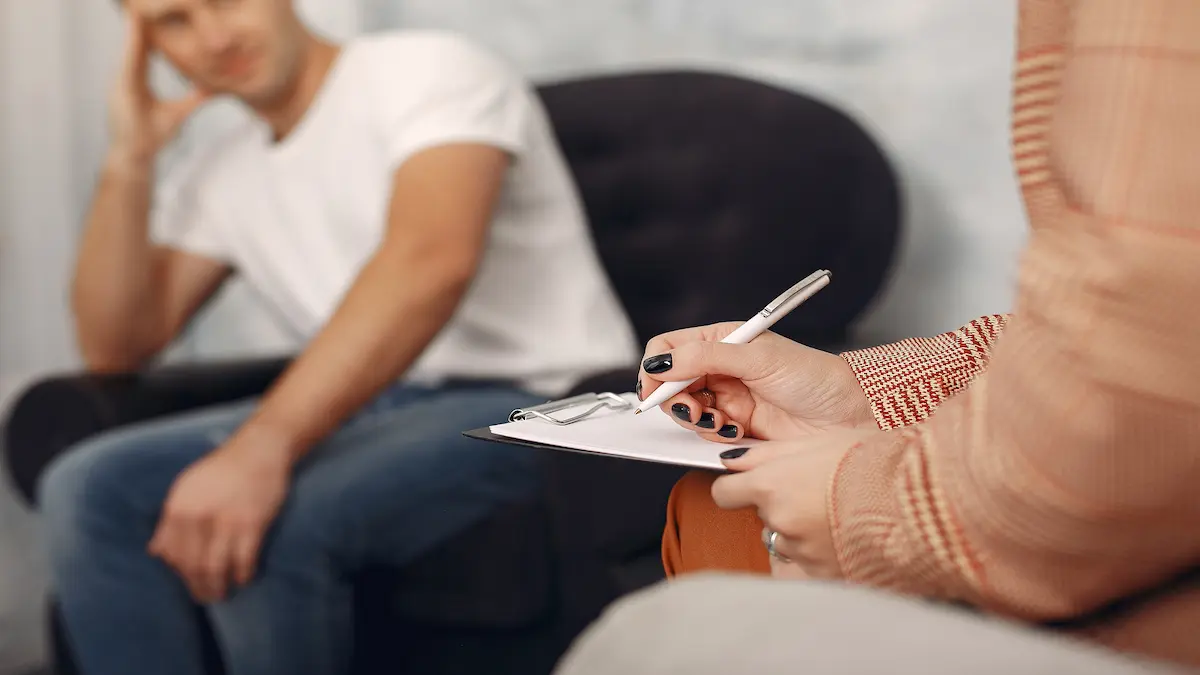
How to prepare for the first therapy session? Getting ready for your first therapy session can feel overwhelming for some and frightening for others, but it’s important to be prepared and stay hopeful about therapy. Going to therapy is a courageous step, and you should take pride in yourself for doing so.
There are many reasons to prepare for therapy that can be beneficial later on, including:
- Helps you stay organized with your concerns
- Gives you time to journal what you’ve already tried
- Makes you learn what helps and what doesn’t help you
- Lets you focus on the issues you consider most urgent
- Helps you remember other struggles that may be part of a larger issue
How to find the right therapist?
Since the therapeutic relationship is a key indicator of therapy success, it’s best to research and select a therapist with direct experience in your specific concerns. A friend or family member might recommend seeing a therapist. If they do, ensure the therapist specializes in your particular concerns.
10 simple first therapy session tips
Here are 10 first therapy session tips you can adhere to:
1 Think about why you want therapy
A common question मानसिक स्वास्थ्य professionals ask when meeting a client is what brought them to therapy, because the client’s purpose helps the therapist develop an effective plan for the therapy sessions. Make a list of your symptoms, including bothersome thoughts, emotions, behaviors, past experiences, current situations, and stressors. While you don’t need to list all your concerns and goals in detail, understanding the main reason you’re seeking therapy can make you feel more prepared to see a therapist for the first time.
2 Write down what you want to talk about
Before your therapy session, it’s helpful to jot down the issues you want to discuss, important events and thoughts you’ve had, and any questions you might have for your therapist. Additionally, writing a letter in advance may help explain the reasons for seeking their help and clarify what you hope to accomplish.
3 Don’t worry about saying the perfect thing
You can’t say anything “wrong” in therapy, and your therapist should be skilled at guiding the conversation in helpful ways. It’s a time and space for you to explore your thoughts and feelings, and the main purpose of seeing a therapist is to receive guidance. You are the person who knows yourself best, and if there’s something you don’t know, it will eventually work itself out.
4 Wear something comfortable
Therapy is meant for you, so there’s no need to feel pressured to dress a certain way. It is important that you feel comfortable during your session, so please wear layers if the weather is too cold or hot. If you can’t sit comfortably in certain jeans, wear sweatpants instead. No matter what you pick, prioritize comfort.
5 Ask for a quick call if you’re feeling nervous
If talking to a therapist you’ve never met in person makes you anxious, you can opt for a phone consultation before starting therapy. While it’s not mandatory, many therapists expect you to request a brief phone consultation because they understand that choosing a therapist is a significant decision. You might even experience some anticipatory anxiety before your session.
6 Make a list of questions to ask your therapist
Asking your therapist questions is a good way to build rapport when you’re feeling anxious. Sharing that you feel that way is also helpful, as your therapist can help you work through any discomfort you’re experiencing about being in therapy. It may be helpful to share your insecurities with your therapist, as they could be connected to the reason you’re in therapy in the first place.
Questions you can ask
There may be many questions you’d like to ask your therapist, but during the first session, you might find yourself wondering where to start. Some questions you might begin with include:
- What kind of therapy do you do?
- How long will it take to see changes?
- How can I know if therapy is working?
7 It’s okay if you cry or feel emotional
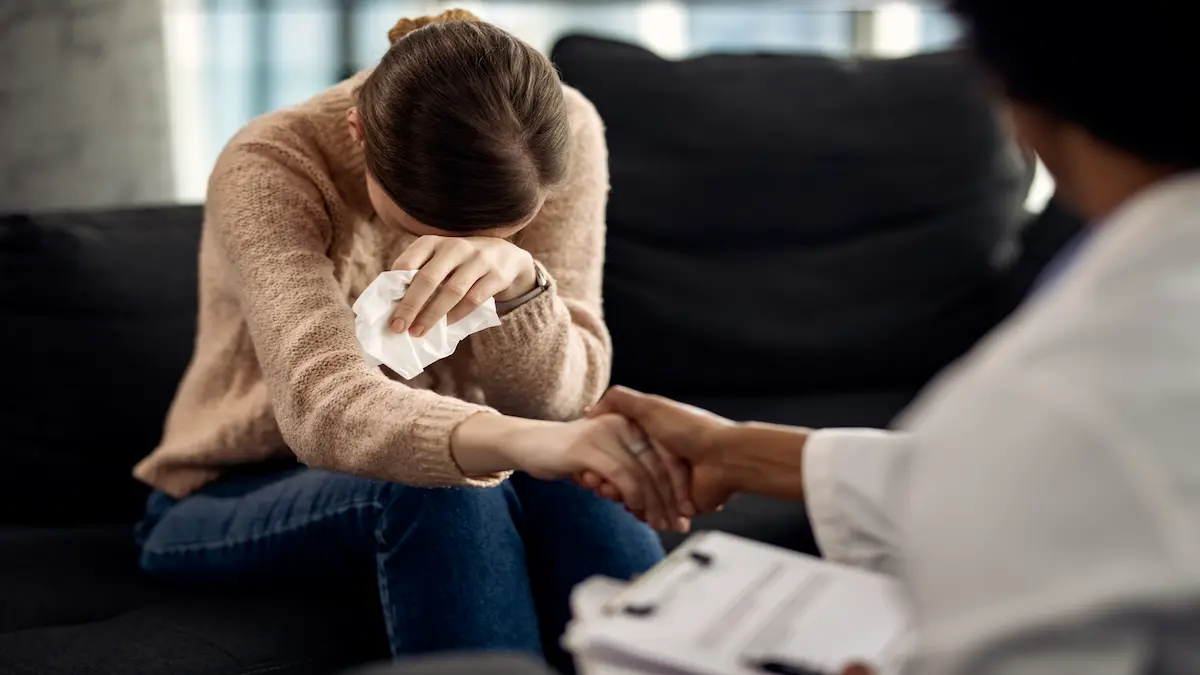
It’s completely normal to cry during the first session. Crying provides a healthy release for the body and should not be regarded as a weakness. We are all on a unique emotional journey that involves experiencing a variety of feelings. Crying should be accepted in therapy and daily life.
8 Talk to someone you trust before or after
Discussing the option of going to therapy is entirely optional, but having a support system that checks in with you before or after your first session and subsequent visits can be really helpful. You should keep practising what you’re learning in sessions outside of the therapy office.
9 Sort out the paperwork or payment early
Sometimes, you may have spoken with your therapist or their office staff beforehand to understand how therapy works. If you haven’t received basic information about their policies, the first session is the perfect time to ask questions.
Practical questions that may come up during your first therapy session include:
- Billing information, including the cost of therapy, whether they accept mental health insurance, and if they offer a sliding scale or payment plans
- How many sessions can you expect to have
- How often do you meet with this therapist
- The duration of each session
Knowing your therapist’s procedures helps you plan and incorporate therapy into your life.
10 Be open-minded and give it time
Your first therapy session might feel a bit unfamiliar, and that’s completely normal. You may not connect immediately with your therapist, or you might leave wondering if it “worked.” That’s okay.
Be open-minded and approach the experience with curiosity rather than judgment about your therapist, the process itself, and even yourself. You might discover new perspectives or feel challenged by questions you hadn’t considered before. Instead of shutting down or expecting instant clarity, allow yourself to explore the situation.
Give it time and let the relationship and the work develop naturally. Like any connection or habit, it might take a few sessions to feel comfortable, safe, and understood. Trust builds over time, and real change often happens gradually, not in a single conversation.
So, if you don’t leave session one feeling transformed, don’t worry. Keep showing up with an open heart and some patience—it’s worth it.
What to expect in your first therapy session?
Your first session is about getting to know each other, learning about your background, and giving you some time to become comfortable in the therapy room while talking about your life and history. It allows you to get comfortable with your therapist and see how you feel around them.
How long is a therapy session?
Therapy sessions usually last between 45 and 60 minutes. It mainly depends on the provider and the issues you present to them. For example, some couples therapists provide sessions that last about 90 minutes.
How much does it typically cost?
Therapy costs can differ depending on factors like insurance coverage and provider networks. Online therapy platforms typically charge weekly or monthly fees, but not all of them accept insurance. Some providers accept insurance for online therapy.
What if you need medication or a referral?
If you require medication, you may be referred to a psychiatrist or your primary care provider for follow-up, which may include blood work and a medication assessment.
What to do after your first session?
After your first session, it can be helpful to start journaling how you feel, your thoughts on how therapy went, and what you believe changed for you during that session. Taking time to reflect is a good way to stay engaged with therapy after your session and consider how to apply any breakthroughs you may have experienced.
Preparing for therapy
Preparing for your first therapy session can be nerve-wracking. However, knowing what to expect, which questions to ask your therapist, and tips to feel more comfortable can help you get the most out of your experience.
Remember that therapy is a collaborative process, and your therapist is there to support you all along your journey toward better mental health. By preparing for your session, you can make sure you’re on the right path to achieving your goals.
अक्सर पूछे जाने वाले प्रश्न
Beginning therapy can bring up many questions—here are some common ones to help you feel more prepared for your first session.
1 Do I need to bring anything to the session?
Not necessarily. You don’t need to prepare anything formal, but it can help to jot down what brought you to therapy or a few things you’d like to talk about. If it’s an in-person session, bring any paperwork your therapist might’ve asked for. If it’s online, make sure you have a private space and a stable internet connection.
2 What if I don’t know what to say?
That’s more common than you think! Your therapist will guide the conversation and help you feel at ease. You don’t need to have the “right” words—just start where you are, even if it’s saying, “I’m not sure where to begin.” That honesty is more than enough.
3 Will the therapist give me advice right away?
Not usually. The first session is primarily about understanding you, your background, what you’re going through, and what you hope to work on. While therapists may offer some insights, their role isn’t to give quick-fix advice but to support you in understanding and navigating things in a deeper way.
4 How do I know if the therapist is the right fit for me?
It’s okay if you’re not sure after just one session. Pay attention to how you feel—do you feel safe, heard, and not judged? A good fit means you feel respected and comfortable over time. If something doesn’t feel right, it’s perfectly okay to explore other therapists until you find the right one.
5 Do I have to share everything in the first session?
Absolutely not. Share only what you’re comfortable with. The first session focuses on initiating the conversation and establishing trust. As that trust grows, you’ll likely feel more at ease opening up at your own pace.
Key Takeaways
- Preparing for therapy helps you stay organized with your concerns and gives you time to journal what you’ve already tried.
- Think about why you want therapy, write down what you want to discuss, and don’t worry about saying the perfect thing.
- Additionally, create a list of questions to ask your therapist, consider speaking with someone you trust before or after, and settle the paperwork or payment in advance.
Stay tuned to the Activ Living Community. Keep up to date with the latest health tips and trends through expert videos, podcasts, articles, and much more on पोषण, फिटनेस, सचेतन, और लाइफस्टाइल से जुड़ी बीमारियां like Asthma, Blood Pressure, Cholesterol, and Diabetes. Activ Living ke saath sahi sehat ki shuruat ABHI karo.
You may also be interested in the following blogs:
- Why You Should Not Delay Therapy: Prioritize Mental Health
- मानसिक स्वास्थ्य के रोग काम और फुरसत के समय को कैसे प्रभावित करते हैं? ऑक्यूपेशनल थेरेपी कैसे मदद कर सकती है?
Popular Searches
How to lower blood pressure | Fruits good for liver | Unhealthy foods | रागी के लाभ | बेसल मेटाबोलिक रेट | हाई ब्लड प्रेशर के लिए एक्यूप्रेशर पॉइंट्स | Ayurvedic medicine for blood pressure | How to control cholesterol at home | Homeopathy for Asthma | Biological Age | Home remedies for TB | Natural beta blockers | Negative effects of internet | Types of walking | ब्लड प्रेशर कैलकुलेटर | ब्लड शुगर कैलकुलेटर | BMI कैलकुलेटर





 1800-270-7000
1800-270-7000

